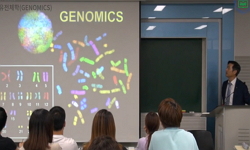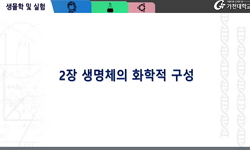Background: Cell division cycle 6 (CDC6) is an essential regulator of DNA replication and plays important roles in the activation and maintenance of the checkpoint mechanisms in the cell cycle. CDC6 has been associated with oncogenic activities in hum...
http://chineseinput.net/에서 pinyin(병음)방식으로 중국어를 변환할 수 있습니다.
변환된 중국어를 복사하여 사용하시면 됩니다.
- 中文 을 입력하시려면 zhongwen을 입력하시고 space를누르시면됩니다.
- 北京 을 입력하시려면 beijing을 입력하시고 space를 누르시면 됩니다.
https://www.riss.kr/link?id=A105942849
- 저자
- 발행기관
- 학술지명
- 권호사항
-
발행연도
2018
-
작성언어
English
- 주제어
-
등재정보
KCI등재,SCI,SCIE,SCOPUS
-
자료형태
학술저널
-
수록면
1-10(10쪽)
-
KCI 피인용횟수
4
- 제공처
-
0
상세조회 -
0
다운로드
부가정보
다국어 초록 (Multilingual Abstract)
Background: Cell division cycle 6 (CDC6) is an essential regulator of DNA replication and plays important roles in the activation and maintenance of the checkpoint mechanisms in the cell cycle. CDC6 has been associated with oncogenic activities in human cancers; however, the clinical significance of CDC6 in prostate cancer (PCa) remains unclear.
Therefore, we investigated whether the CDC6 mRNA expression level is a diagnostic and prognostic marker in PCa.
Methods: The study subjects included 121 PCa patients and 66 age-matched benign prostatic hyperplasia (BPH) patients. CDC6 expression was evaluated using real-time polymerase chain reaction and immunohistochemical (IH) staining, and then compared according to the clinicopathological characteristics of PCa.
Results: CDC6 mRNA expression was significantly higher in PCa tissues than in BPH control tissues (P = 0.005). In addition, CDC6 expression was significantly higher in patients with elevated prostate-specific antigen (PSA) levels (> 20 ng/mL), a high Gleason score, and advanced stage than in those with low PSA levels, a low Gleason score, and earlier stage, respectively. Multivariate logistic regression analysis showed that high expression of CDC6 was significantly associated with advanced stage (≥ T3b) (odds ratio [OR], 3.005; confidence interval [CI], 1.212–7.450; P = 0.018) and metastasis (OR, 4.192; CI, 1.079–16.286; P = 0.038).
Intense IH staining for CDC6 was significantly associated with a high Gleason score and advanced tumor stage including lymph node metastasis stage (linear-by-linear association, P = 0.044 and P = 0.003, respectively).
Conclusion: CDC6 expression is associated with aggressive clinicopathological characteristics in PCa. CDC6 may be a potential diagnostic and prognostic marker in PCa patients.
참고문헌 (Reference)
1 Sun TY, "miR-26a inhibits the proliferation of ovarian cancer cells via regulating CDC6 expression" 8 (8): 1037-1046, 2016
2 강호원, "The Within-Group Discrimination Ability of the Cancer of the Prostate Risk Assessment Score for Men with Intermediate-Risk Prostate Cancer" 대한의학회 33 (33): 25-33, 2018
3 Hartwell LH, "Sequential function of gene products relative to DNA synthesis in the yeast cell cycle" 104 (104): 803-817, 1976
4 Ohtani K, "Regulation of cell growth-dependent expression of mammalian CDC6 gene by the cell cycle transcription factor E2F" 17 (17): 1777-1785, 1998
5 Ruckle HC, "Prostate-specific antigen: concepts for staging prostate cancer and monitoring response to therapy" 69 (69): 69-79, 1994
6 서원익, "Predictive Value of the Cancer of the Prostate Risk Assessment Score for Recurrence-Free Survival After Radical Prostatectomy in Korea: A Single-Surgeon Series" 대한비뇨의학회 55 (55): 321-326, 2014
7 Zhang X, "MicroRNA-26a/b regulate DNA replication licensing, tumorigenesis, and prognosis by targeting CDC6 in lung cancer" 12 (12): 1535-1546, 2014
8 Romanowski P, "Mechanisms restricting DNA replication to once per cell cycle: MCMs, pre-replicative complexes and kinases" 6 (6): 184-188, 1996
9 Feng CJ, "Knockdown of CDC6 inhibits proliferation of tongue squamous cell carcinoma Tca8113 cells" 12 (12): 173-181, 2013
10 Sasaki H, "Human MOB1 expression in non-small-cell lung cancer" 8 (8): 273-276, 2007
1 Sun TY, "miR-26a inhibits the proliferation of ovarian cancer cells via regulating CDC6 expression" 8 (8): 1037-1046, 2016
2 강호원, "The Within-Group Discrimination Ability of the Cancer of the Prostate Risk Assessment Score for Men with Intermediate-Risk Prostate Cancer" 대한의학회 33 (33): 25-33, 2018
3 Hartwell LH, "Sequential function of gene products relative to DNA synthesis in the yeast cell cycle" 104 (104): 803-817, 1976
4 Ohtani K, "Regulation of cell growth-dependent expression of mammalian CDC6 gene by the cell cycle transcription factor E2F" 17 (17): 1777-1785, 1998
5 Ruckle HC, "Prostate-specific antigen: concepts for staging prostate cancer and monitoring response to therapy" 69 (69): 69-79, 1994
6 서원익, "Predictive Value of the Cancer of the Prostate Risk Assessment Score for Recurrence-Free Survival After Radical Prostatectomy in Korea: A Single-Surgeon Series" 대한비뇨의학회 55 (55): 321-326, 2014
7 Zhang X, "MicroRNA-26a/b regulate DNA replication licensing, tumorigenesis, and prognosis by targeting CDC6 in lung cancer" 12 (12): 1535-1546, 2014
8 Romanowski P, "Mechanisms restricting DNA replication to once per cell cycle: MCMs, pre-replicative complexes and kinases" 6 (6): 184-188, 1996
9 Feng CJ, "Knockdown of CDC6 inhibits proliferation of tongue squamous cell carcinoma Tca8113 cells" 12 (12): 173-181, 2013
10 Sasaki H, "Human MOB1 expression in non-small-cell lung cancer" 8 (8): 273-276, 2007
11 Deng Y, "High expression of CDC6 is associated with accelerated cell proliferation and poor prognosis of epithelial ovarian cancer" 212 (212): 239-246, 2016
12 Makarov DV, "Gleason score 7 prostate cancer on needle biopsy: is the prognostic difference in Gleason scores 4 + 3 and 3 + 4 independent of the number of involved cores?" 167 (167): 2440-2442, 2002
13 Negrini S, "Genomic instability--an evolving hallmark of cancer" 11 (11): 220-228, 2010
14 Charames GS, "Genomic instability and cancer" 3 (3): 589-596, 2003
15 Martin CM, "Gene expression profiling in cervical cancer: identification of novel markers for disease diagnosis and therapy" 511 : 333-359, 2009
16 Liu Y, "FOXM1 and androgen receptor co-regulate CDC6 gene transcription and DNA replication in prostate cancer cells" 1839 (1839): 297-305, 2014
17 Feng CJ, "Expression of Mcm7 and CDC6 in oral squamous cell carcinoma and precancerous lesions" 28 (28): 3763-3769, 2008
18 Partin AW, "Combination of prostate-specific antigen, clinical stage, and Gleason score to predict pathological stage of localized prostate cancer. A multi-institutional update" 277 (277): 1445-1451, 1997
19 Hateboer G, "Cell cycle-regulated expression of mammalian CDC6 is dependent on E2F" 18 (18): 6679-6697, 1998
20 Borlado LR, "CDC6: from DNA replication to cell cycle checkpoints and oncogenesis" 29 (29): 237-243, 2008
21 Niimi S, "CDC6 protein obstructs apoptosome assembly and consequent cell death by forming stable complexes with activated Apaf-1 molecules" 287 (287): 18573-18583, 2012
22 Yan Z, "CDC6 is regulated by E2F and is essential for DNA replication in mammalian cells" 95 (95): 3603-3608, 1998
23 Piatti S, "CDC6 is an unstable protein whose de novo synthesis in G1 is important for the onset of S phase and for preventing a ‘reductional’ anaphase in the budding yeast Saccharomyces cerevisiae" 14 (14): 3788-3799, 1995
24 Ohta S, "CDC6 expression as a marker of proliferative activity in brain tumors" 8 (8): 1063-1066, 2001
25 Xiong XD, "Association between the CDC6 G1321A polymorphism and the risk of cervical cancer" 20 (20): 856-861, 2010
26 Kattan MW, "A preoperative nomogram for disease recurrence following radical prostatectomy for prostate cancer" 90 (90): 766-771, 1998
27 Xiong XD, "A novel functional polymorphism in the CDC6 promoter is associated with the risk for hepatocellular carcinoma" 643 (643): 70-74, 2008
28 Jin F, "A novel androgen receptor-binding element modulates CDC6 transcription in prostate cancer cells during cell-cycle progression" 37 (37): 4826-4838, 2009
29 Williams RS, "A human protein related to yeast Cdc6p" 94 (94): 142-147, 1997
동일학술지(권/호) 다른 논문
-
- 대한의학회
- 강지은
- 2018
- KCI등재,SCI,SCIE,SCOPUS
-
Influences of Tobacco-Related Knowledge on Awareness and Behavior towards Smoking
- 대한의학회
- 박진주
- 2018
- KCI등재,SCI,SCIE,SCOPUS
-
Pregnancy Rates and Outcomes of HIV-Infected Women in Korea
- 대한의학회
- 최흔
- 2018
- KCI등재,SCI,SCIE,SCOPUS
-
A Case of Retinal Vessel Occlusion Caused by Bartonella Infection
- 대한의학회
- 우민지
- 2018
- KCI등재,SCI,SCIE,SCOPUS
분석정보
인용정보 인용지수 설명보기
학술지 이력
| 연월일 | 이력구분 | 이력상세 | 등재구분 |
|---|---|---|---|
| 2023 | 평가예정 | 해외DB학술지평가 신청대상 (해외등재 학술지 평가) | |
| 2020-01-01 | 평가 | 등재학술지 유지 (해외등재 학술지 평가) |  |
| 2011-01-01 | 평가 | 등재학술지 유지 (등재유지) |  |
| 2009-01-01 | 평가 | 등재학술지 유지 (등재유지) |  |
| 2005-01-01 | 평가 | SCI 등재 (등재유지) |  |
| 2002-01-01 | 평가 | 등재학술지 선정 (등재후보2차) |  |
| 1999-07-01 | 평가 | 등재후보학술지 선정 (신규평가) |  |
학술지 인용정보
| 기준연도 | WOS-KCI 통합IF(2년) | KCIF(2년) | KCIF(3년) |
|---|---|---|---|
| 2016 | 1.48 | 0.37 | 1.06 |
| KCIF(4년) | KCIF(5년) | 중심성지수(3년) | 즉시성지수 |
| 0.85 | 0.75 | 0.691 | 0.11 |








 KCI
KCI






